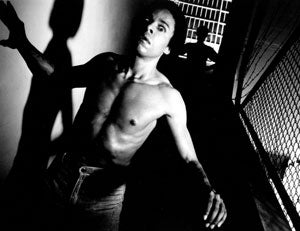On Friday, October 14th, Jamaa Fanaka’s films Penitentiary and A Day in the Life of Willie Faust, or Death on the Installment Plan screened at the Billy Wilder Theater. Fanaka was in attendance and participated in a Q&A after the screening.
The Q&A revealed that Fanaka, like his films, possesses a quirky sense of humor, and a strong sense of morality.
Fanaka kept the audience roaring with laughter and was able to make even the most intense of stories humorous. His love for the craft shined through his lecture and he gave humor and lightness to stories that would otherwise lack those qualities. He described how he had run out of money three days before finishing Penitentiary and told the cast and crew that he would be unable to complete the film. All were eager to finish the project and told him that they would do the last three days for free as long as he fed them. Unfortunately, Fanaka didn’t even have enough money to feed the crew, but one of his actors, Wilbur 'Hi-Fi' White, stepped up to the plate and told him that he would handle the food. After the film was complete Fanaka approached White and asked him how he managed to feed everyone, White told him that he collected the cast’s and crew’s leftover food stamps and with that was able to scrape up enough food for everyone. With this story, among many others, laughter filled the theater.

Fanaka also described how all of his films have a strong moral view; Penitentiary and A Day in The Life of Willie Faust are no different. The main characters of both films are impacted by their decisions. In A Day in The Life of Willie Faust, the drug user Willie eventually overdoses and dies; conversely, the lead character in Penitentiary, Too Sweet, comes to the aid of his fellow inmates and is rewarded with early release from prison.
The Q&A also highlighted Fanaka’s dedication to his craft. He recounted a controversial tale about how he managed to get the shot of Willie Faust shooting heroin into his vein. Faust was played by Fanaka, but for this shot Fanaka used a body double who happened to be a heroin addict. Fanaka wanted the shot to be authentic and to convince the addict to act in his film, Fanaka provided him with heroin. Some in the room reacted to this story with horror, others with laughter. While the reactions to the story were all different, everyone in the audience left with a deeper sense of Fanaka’s determination to make films the way he sees fit and a strong sense of his passion for filmmaking.
—Moana Sherrill






 Mobile Navigation
Mobile Navigation


Comments